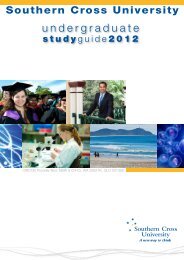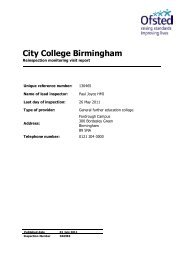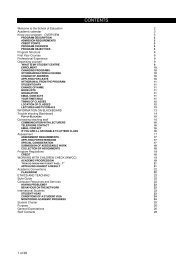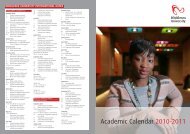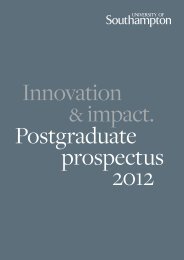Academic calendar Academic calendar - Study in the UK
Academic calendar Academic calendar - Study in the UK
Academic calendar Academic calendar - Study in the UK
You also want an ePaper? Increase the reach of your titles
YUMPU automatically turns print PDFs into web optimized ePapers that Google loves.
Biology<br />
Honours Major: (16 courses)<br />
• BIO-121; 122;<br />
• Four BIO-200-level electives;<br />
• Six BIO-300-level electives;<br />
• Four BIO-400-level electives, one of which is BIO-485<br />
Cognate Requirements:<br />
• CHE-121; 122; 263; 264; MAT-121; 122; 215 (217 is also recommended);<br />
PHY-121; 122; HIS-313; PHL-314<br />
• Completion of BIO-121-122, CHE-121-122 and MAT-121-122 with a 7.00<br />
(B-) average is required for admission to <strong>the</strong> honours major. Honours is<br />
recommended for students <strong>in</strong>tend<strong>in</strong>g to apply to graduate school.<br />
Four-Year Major: (14 courses)<br />
• BIO-121; 122;<br />
• Four BIO-200-level electives;<br />
• Eight BIO-300- or 400-level electives<br />
Cognate Requirements:<br />
• CHE-121; 122; 263; 264; MAT-121; 122; 215 (217 is also recommended);<br />
PHY-121; 122; HIS-313; PHL-314<br />
• Completion of BIO-121-122 and CHE-121-122 with a 6.00 (C+) average is<br />
required for admission to <strong>the</strong> four-year major.<br />
General Major: (10 courses)<br />
• BIO-121; 122;<br />
• Four BIO-200-level electives;<br />
• Four BIO-300- or 400-level electives<br />
Cognate Requirements:<br />
• CHE-121; 122; MAT-114 or 121 (students with Grade 12 U ma<strong>the</strong>matics may<br />
take PHY-115 <strong>in</strong>stead of MAT-114); MAT-201 or 215; HIS-313; PHL-314<br />
• Completion of BIO-121 with a 5.00 (C) average and enrolment <strong>in</strong> BIO-122 is<br />
required for admission to <strong>the</strong> general major.<br />
General Science Major for Pre-Medical or Pre-Dental Students: (12 courses)<br />
• BIO-121; 122;<br />
• Two of BIO-231, 241, 248, 252, 365;<br />
• Two of BIO-341, 342, 362, 467;<br />
• CHE-121; 122; 263; 264;<br />
• PHY-121; 122<br />
Cognate Requirements:<br />
• MAT-121; 122; 215; HIS-313; PHL-314<br />
M<strong>in</strong>or: (6 courses)<br />
• BIO-121; 122;<br />
• Two BIO-300-level electives;<br />
• Two BIO-200- or 300-level electives (<strong>in</strong>clud<strong>in</strong>g courses offered by <strong>the</strong><br />
Au Sable Institute of Environmental Studies)<br />
Cognate Requirements:<br />
• ENV-101 or CHE-121; MAT-114 or 121 or PHY-115 or 121<br />
* Students <strong>in</strong>terested <strong>in</strong> Environmental Stewardship have <strong>the</strong> option of tak<strong>in</strong>g some of<br />
<strong>the</strong>ir 3 and 400-level courses through <strong>the</strong> Au Sable Institute of Environmental Studies.<br />
These courses are chosen <strong>in</strong> consultation with <strong>the</strong> department to ensure that <strong>the</strong>y<br />
complement, but do not duplicate, courses offered at Redeemer. For more <strong>in</strong>formation,<br />
contact <strong>the</strong> department chair and visit <strong>the</strong> Au Sable website at www.ausable.org.<br />
BIO-101 Biological Science<br />
(F/W)<br />
A course designed to foster <strong>in</strong> <strong>the</strong> non-science student an appreciation<br />
for <strong>the</strong> impact biology has <strong>in</strong> everyday life. Students will explore a<br />
variety of biological topics with an emphasis on <strong>the</strong> application of<br />
biology to current issues. Areas of study may <strong>in</strong>clude: <strong>in</strong>troduction<br />
to life on earth, heredity, human anatomy/physiology, botany and<br />
ecology. Includes a weekly three-hour lab.<br />
Exclusion: 70% or higher <strong>in</strong> Grade 12 U Biology and/or BIO-121<br />
BIO-121 Introduction to Biology I<br />
A course designed as both an <strong>in</strong>troduction to <strong>the</strong> discipl<strong>in</strong>e for biology<br />
majors and m<strong>in</strong>ors and a core for non-science students with adequate<br />
high school preparation. This course exam<strong>in</strong>es biology rang<strong>in</strong>g from<br />
<strong>the</strong> diversity of life and ecology down to <strong>the</strong> level of <strong>the</strong> cell. The<br />
structure and function of representative species of bacteria, protists,<br />
fungi, plants and animals are exam<strong>in</strong>ed <strong>in</strong> both <strong>the</strong> lecture and <strong>the</strong><br />
laboratory, and Christian perspectives on evolutionary <strong>the</strong>ory are<br />
discussed. Includes a weekly three-hour lab.<br />
Prerequisite: Grade 12 U Biology or a “B” stand<strong>in</strong>g <strong>in</strong> BIO-101; Grade 12 U Chemistry or<br />
permission of <strong>the</strong> department<br />
Corequisite: CHE-121 or permission of <strong>the</strong> <strong>in</strong>structor<br />
BIO-122 Introduction to Biology II<br />
(W)<br />
Emphasis is placed on <strong>the</strong> molecular and cellular processes <strong>in</strong> liv<strong>in</strong>g<br />
organisms, and how <strong>the</strong>se processes are <strong>in</strong>volved <strong>in</strong> <strong>the</strong> physiology<br />
of representative plants and animals. Topics exam<strong>in</strong>ed <strong>in</strong> <strong>the</strong> lecture<br />
and laboratory <strong>in</strong>clude biological molecules, metabolism, genetics,<br />
biotechnology, and <strong>the</strong> structure and function of plants and animals.<br />
Includes a weekly three-hour lab.<br />
Prerequisite: BIO-121<br />
Corequisite: CHE-122 or permission of <strong>the</strong> <strong>in</strong>structor<br />
BIO-225 Survey of <strong>the</strong> Plant K<strong>in</strong>gdom<br />
(W)*<br />
An <strong>in</strong>troduction to <strong>the</strong> major groups of liv<strong>in</strong>g plants, with emphasis on<br />
classification. Aspects of classification <strong>in</strong>clude methods and pr<strong>in</strong>ciples,<br />
comparative biochemistry, structure and function, growth, development<br />
and reproduction. The role of certa<strong>in</strong> plants as a source of fundamental<br />
biological knowledge is emphasized. Includes a weekly three-hour lab.<br />
Prerequisite: BIO-122 or permission of <strong>the</strong> <strong>in</strong>structor<br />
BIO-231 Cell Biology *<br />
A study of <strong>the</strong> structure and function of cells as <strong>the</strong> fundamental<br />
build<strong>in</strong>g units of liv<strong>in</strong>g organisms. Topics <strong>in</strong>clude cell growth and<br />
metabolism, <strong>the</strong> molecular constituents of cells, major cell organelles<br />
and special cell functions. Methods of <strong>in</strong>vestigation will be exam<strong>in</strong>ed<br />
throughout <strong>the</strong> course, and <strong>the</strong> development of hypo<strong>the</strong>ses and <strong>the</strong>ories<br />
will be placed <strong>in</strong> a historical and contemporary context. Includes a<br />
weekly three-hour lab.<br />
Prerequisite: BIO-122 or permission of <strong>the</strong> <strong>in</strong>structor<br />
BIO-235 Ecology (ENV-235)<br />
(F)*<br />
An <strong>in</strong>troduction to organismal or physiological ecology (<strong>the</strong> <strong>in</strong>teractions<br />
of organisms with <strong>the</strong>ir physical environment), population and<br />
community biology, and <strong>the</strong> structure and function of ecosystems.<br />
Includes a weekly three-hour lab or field work.<br />
Prerequisite: BIO-122 or permission of <strong>the</strong> <strong>in</strong>structor<br />
BIO-241 Survey of <strong>the</strong> Animal K<strong>in</strong>gdom *<br />
An <strong>in</strong>troduction to <strong>the</strong> major groups of liv<strong>in</strong>g and fossil animals, with<br />
emphasis on classification. Aspects of classification <strong>in</strong>clude methods<br />
and pr<strong>in</strong>ciples, comparative biochemistry, structure, function, growth,<br />
development and reproduction. The importance of certa<strong>in</strong> animals <strong>in</strong><br />
fundamental biological research is emphasized. Includes a weekly<br />
three-hour lab.<br />
Prerequisite: BIO-122<br />
(F)<br />
71




